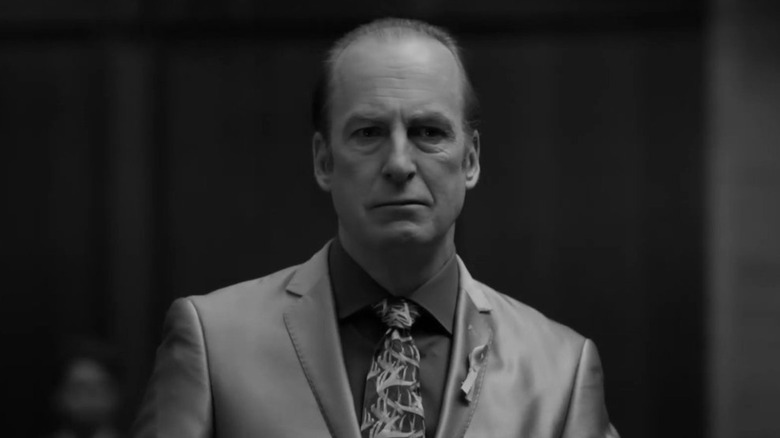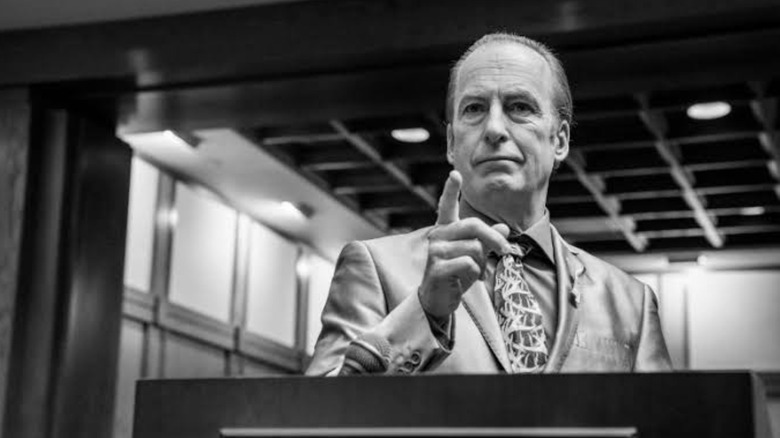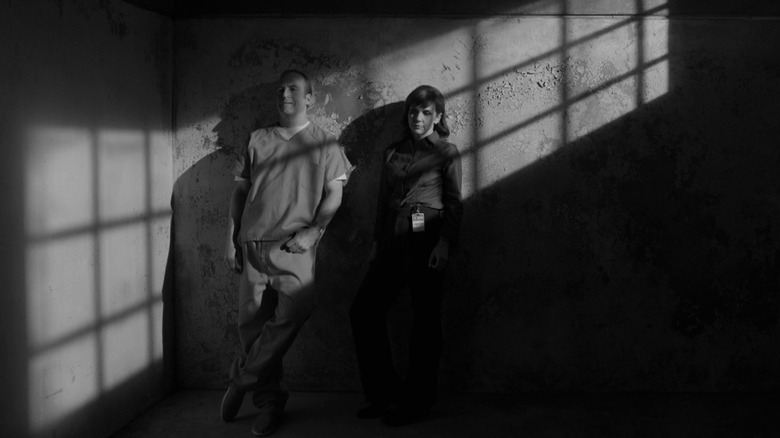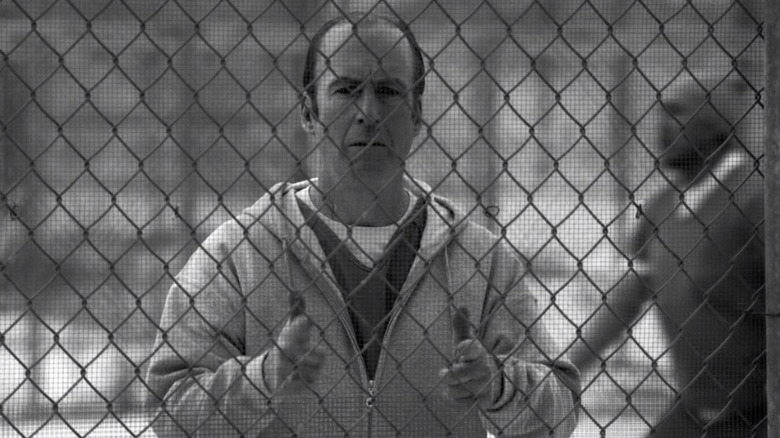Better Call Saul Didn't Give Us A Happy Ending, But It Gave Us The Ending We Needed
This story contains major spoilers for the end of "Better Call Saul."
After seven long years and several schemes, "Better Call Saul" has come to an end. Unlike its "Breaking Bad" counterpart "Felina," "Saul Gone" was (mostly) a quiet, contemplative episode that examines the decisions Jimmy/Saul (Bob Odenkirk) made over the course of his career. It didn't end with a big shootout, but it also didn't end with a full redemption either; after being arrested in Omaha, Jimmy dons his Saul persona in order to get himself a lighter sentence at a high-end prison. After he supposedly gets only seven years behind bars, he seemingly lets it slip that he has information that could involve his ex-wife, Kim (Rhea Seehorn).
However, it turns out that's not actually the case. When the time comes for his official arrangement, Jimmy defaults back to his true identity, confessing to lying about having information that could affect Kim as well as admitting to willfully participating in the numerous crimes he's being prosecuted for. These revelations, which include his involvement in his brother Chuck's (Michael McKean) suicide, are what unravel Jimmy's chances of ever leading a normal life ever again, and that's okay in his book.
It's okay for us as viewers, as well. A happy ending would have seen him pull off one last scheme, where he somehow either gets that seven years in a prison with a golf program — or even gets away with it relatively scot-free. However, that wouldn't do Jimmy's character evolution justice. Thankfully, the ending we got did just that.
The name's McGill
See, what Jimmy was talking about originally about being coerced into being wrapped up in the Heisenberg operation technically wasn't wrong. When he arrived at that open grave in his "Breaking Bad' introductory episode, we saw that the fear of not doing as Walter (Bryan Cranston) and Jesse (Aaron Paul) say was present. The thing, though, is that he quickly grew to love doing what he did. Out of that initial fear came an opportunity for manipulation, money, and most importantly of all, a relatively familiar safety net. He had already gone this far down with the drug cartels, and since he had nothing left to lose (i.e, Kim), why not just commit to the bit and become the legal counsel for the region's most promising meth cook?
The fact that both versions of the story that he told were true is a true testament to how conflicted of a character Jimmy is. He could have easily stuck to the blame game, but there is also a large part of him that knows he needs to take responsibility for everything he's done, whether those things were crimes or not. He knew what he had to do in order to put himself and those affected by his actions, mainly Kim, at peace — Jimmy had to confess to everything, risking his freedom to do so. There really was no other option for him other than to just give everything up for good.
I just wanted her to come today
Jimmy's choice wasn't entirely a self-centered decision, either. He wanted to ensure Kim, who he had not seen in six years, that everything was going to finally end. His actions made sure that she didn't have to run away from her past and passions anymore, as her life incognito was a miserable, repressive one. It wasn't necessarily a move of protection, but rather of comfort and reassurance, maybe even a move to ask for forgiveness for turning her life upside down.
If those final scenes of the episode are anything to go by, she accepted his unspoken offer. Jimmy's sacrifice was what led Kim back into doing what she loves the most — helping others through the rule of law. It's unclear whether she is now Jimmy's lawyer as she claims to be (after all, what's wrong with a little white lie?), but what is clear is that what he did was for the betterment of the both of them. As they finally reunite in that jail cell, the two share a cigarette just as they did in the very first episode of the series, the tension between them even more intense due to their setting. When Kim leaves the prison that Jimmy will spend the next eighty-six years in, she returns his finger guns in the most discreet way possible, signifying just how much he still means to her. It is the perfect end to a perfect on-screen relationship, one that could have only been achieved through the choice to confess to everything.
It's all good, man
To call the ending of "Better Call Saul" bittersweet would be an understatement. After seeing the complicated man behind the abrasive persona, you can't help but feel bad that Jimmy will spend the rest of his days in prison. After all, even the worst of his actions had at least a kernel of good intentions behind them.
However, he wouldn't want the viewers to pity him. He knew exactly what he wanted to do while on the stand at his arrangement, and that was to embrace the worst possible outcome. Jimmy knew what he had to do in order to finally feel free from all the burdens and demons he carried throughout his life. His confession and ruining his negotiated deal was the only way to achieve this.
There is a lot that viewers can unpack regarding "Better Call Saul," and it's likely that the conversations about it won't end now that the series has concluded. However, one thing that shouldn't be debated is if the series finale was a satisfying one, as the answer is a resounding yes. While not necessarily a happy one, it was more than necessary to close off Jimmy's character and to show just how complex of a character he really is. There was truly no other way it could have gone, and that's okay.



